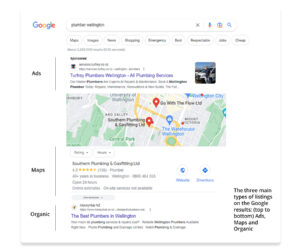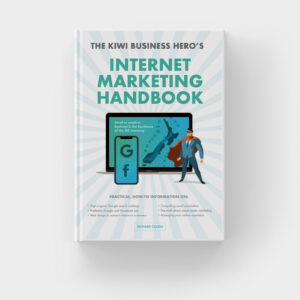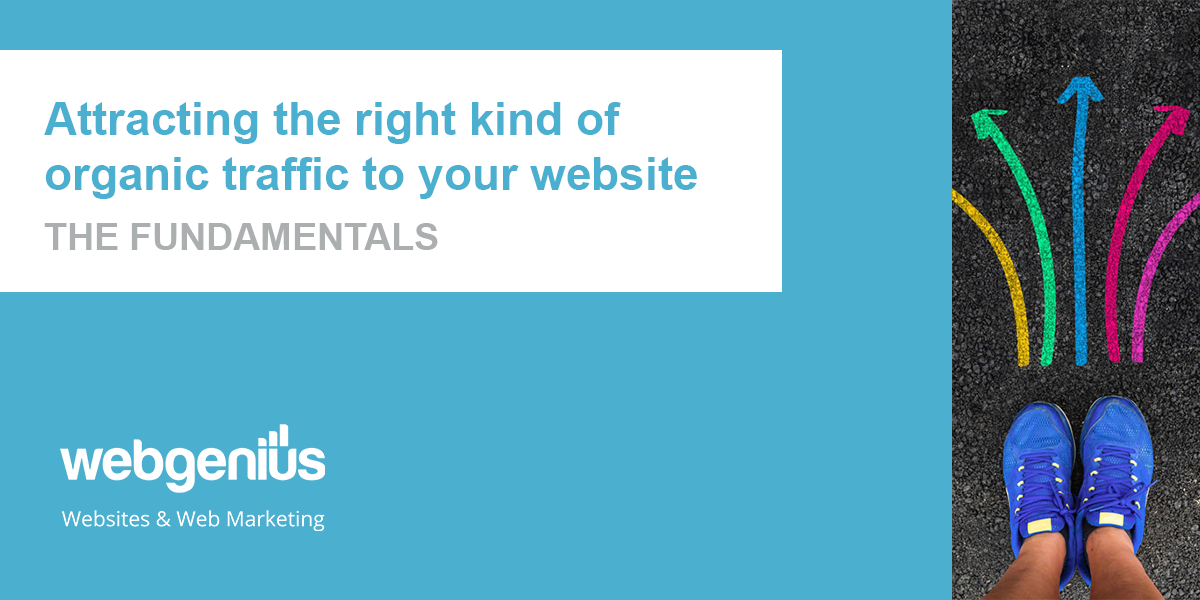If your website cries out and no one hears it – does it even exist?
It is all very well creating an informative, persuasive and elegantly designed website, but unless it can attract visitors who are interested in what you offer it may as well not exist.
When your customers do a search on Google, a page of search results is returned that features three main types of results; Maps listings, organic results and Google Ads listings. Organic traffic refers to the visitors who arrive at your website via search engine results pages (SERPs) without any paid advertising.

Let’s discuss some of the key elements that can help a website to feature prominently in organic search results relevant to your core business, through “Search Engine Optimisation”.
The three main elements of Search Engine Optimisation and attracting the “right kind of organic traffic”
Search engine optimisation (SEO) is the process of improving the ranking of web pages in the search engine results pages (SERPs), like the ones in the image above.
The three main elements of SEO that will give your website the best chance of appearing in search results relevant to your core business are:
- Technical SEO: make your site search engine-friendly
- Content: the right keywords in the right places
- Links: quality and quantity of incoming links
1. Make sure your website is search engine-friendly
As a business owner you probably have better things to do than learn the technical aspects of a Google-friendly website.
However, a knowledge of the basics can help save you from the disaster of having a website built that never has a chance of ranking well.
There are a few important “dos and don’ts” when it comes to ensuring your site is easily found and indexed by the automated software that Google uses:
- DO make sure your website has a “site map”: a page that includes links to every other page on the site, laid out in a way that reflects the site’s structure. To check whether your website has a Google friendly site map type your domain name, then “/sitemap.xml” into a web browser. If nothing appears or it says “page not found”, then raise this with your web developer.
- DON’T lock keywords inside graphics: Text that has been saved as a graphic is effectively invisible to Google, so while it may look good it does not help your page rank.
- DO ensure sufficient page speed: If your website loads very slowly, your rankings may be penalised. You can analyse the speed of your site at: developers.google.com/speed/ pagespeed/insights/. If your site returns a score below 50, then you will need to address this with your web developer.
- DO ensure your site is secure: Have you noticed the padlock that appears to the left of the address bar on your web browser? This indicates that the data flowing between your browser and the web server of the website you are visiting is encrypted and more secure. Sites that lack this feature can expect increasingly to be penalised in the search results
- DO use simple URLs for every page: The URL is the web address that you type in your browser’s address bar to access a webpage. An ideal URL is simple and relevant e.g. http://www.coatsplus.com/leather/jackets
For more detailed information about making your website “search friendly” you can request a free copy of our “Kiwi Business Heroes Internet Marketing Handbook:
Request Free Internet Marketing Handbook
2. Make sure you have great content and the right keywords in the right places
While it’s important that your website looks professional and is visually appealing, it is the words on the website that have the biggest impact on its success in driving the right kind of traffic for your business.
Google’s goal is to provide its users with access to the best, most-relevant information when they search for a particular topic. Sites hosting this type of content will naturally be favoured in the SERP results.
There are a few simple principles to follow:
- Content (copy) is king: If you don’t have great website content, then no amount of window dressing in the form of keyword optimisation and link building is going to cut it. Spend time creating informative, authoritative copy that visitors will want to read and share.
- Keyword-focused pages – and lots of them – are the key: It’s not enough to merely feature the keywords you want to rank for on your home page. What you need are keyword-focused pages – each with useful, original content revolving around a different keyword theme. E.g. if you are a builder you may want pages on “New Builds”, “Bathroom Renovations”, “Kitchen Renovations” and “Hard Landscaping”. Adding more pages over time is a very good strategy too.
- Different page, different keyword phrase: Developing the copy on a page around one primary keyword phrase e.g. “Bathroom Renovations” can help get the sharp focus needed to rank highly for that phrase. Ideally the page will also contain copy around a set of secondary and related phrases that reflect the theme. E.g. “Small Bathroom Transformations”, “Bath To Shower Conversion”.
- Unique content: The text on your page needs to be unique. There is no point copying content from elsewhere and placing it word-for-word on your site. Google doesn’t like it and it’s actually considered plagiarism.
- The right keywords: Google ultimately wants what searchers want – result pages which list the most relevant and best quality web pages related to the word or phrase the searcher has keyed into the search box. Keyword research to determine the best phrases to use is therefore a crucial step in search engine optimisation. Once you have brainstormed ideas of keyword phrases you think your customers are searching for, tools like Google Keyword Planner can help suggest other related phrases that users are searching for and show you how many people are searching each month.
- Keywords in the right places; namely:
- The page title; text that Google usually uses as the heading of the page’s listing whenever it appears in the search results.
- H1 and H2 tags: headlines & subheads
- Body copy and links
- Image names and alt tags
- URLs
- Meta tags
For more detailed information about selecting and optimising for keywords relevant to your business you can request a free copy of our “Kiwi Business Heroes Internet Marketing Handbook below.
3. Make sure you have a good quantity of quality “incoming links”
Along with content another major factor influencing Google rankings is the quality and quantity of links on other websites pointing at your website.
Google regards these links like votes and the more votes from the right websites, the more authority it is accorded by Google and the more likely it is to rank highly.
Ways to build good quality incoming links:
- Develop content that other sites will want to link to: you could include a useful online calculator specific to your industry; a free downloadable report with valuable information; an article or two that others would find interesting.
- Suppliers and friends: Reach out and ask these businesses to set up a link on their website to yours. You could suggest that you provide an informative article for their website that includes links back to your site.
- Distribute and share quality content: One of the most popular ways of building links is to create and then distribute content around the internet that includes links back to your site. E.g.
- Articles & guest blogging
- Videos
- Social Media posts
- Press releases
- Online Directories: There are a number of quality directories on the web where you can list your site for free and generate a link and traffic back to your website. Some New Zealand directories that are worth registering with for their free listing include: www.neighbourly.co.nz, www.finda.co.nz, www.nzsearch.co.nz, www.nzpages.co.nz, www.hotfrog.co.nz, www.locanto.co.nz and www.yalwa.co.nz.
- Blog comments and forum participation: Many small-business people are experts in their field, so there is often an opportunity to join the online conversation in your area of expertise. You can search for blogs in your niche at: www.blogsearchengine.org, www.blogarama.com, www.bloggernity.com and www.blog-search.com.
- Google Maps Listing (Google Business Profile): Making sure your Google Business Profile is up to date and has a link to your website is extremely powerful and also a pathway to receive customer reviews, which are increasingly valuable to businesses.
For more detailed information about building incoming links you can request a free copy of our “Kiwi Business Heroes Internet Marketing Handbook:
Request Free Internet Marketing Handbook
It’s worth the effort
Targeting your website for organic traffic can have a significant impact on your online visibility, credibility, and ultimately, your business success.
Visitors who arrive at your website via search engine results pages without any paid advertising are genuinely interested in what your website has to offer, and they are more likely to engage with your content and convert into customers.
The key things you can do to make your website easy to find online, and by the right people are:
- Make sure your website is search engine-friendly by ensuring it meets the technical requirements of modern SEO
- Make sure you have great content and the right keywords in the right places
- Make sure you have a good quantity of quality “incoming links”
You can find more detail on everything discussed in this article in our free book “Kiwi Business Heroes Internet Marketing Handbook”:

Request Free Internet Marketing Handbook
Happy internet marketing!
Web Genius

